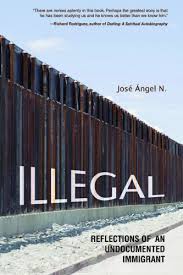The Invisible Man Speaks
Making assumptions about gender, race and ethnicity is easy. The markers are visible and familiar. Citizenship and immigration status are different. There is no way to tell if the man next to you on the sidewalk has an expired or active tourist visa, whether the woman ahead you in line has a real or fraudulent social security card, or whether the child at the playground has dual citizenship or not. There are no tell-tale signs of documentation. Immigrants come in all shapes, sizes and ages. Each has a unique story.
Experts estimate about 11 million people live in the United States without proper documentation. What are their lives like? What does being undocumented feel like? Regardless of your politics on the issue of immigration, these are important questions. They are also are not easy questions to address. Providing an answer would bring attention, and with it, possible deportation. Out of caution, the undocumented are usually silent.
 Jose Angel N. lacks citizenship and legal status, but he has courage. His memoir, Illegal: Reflections of an Undocumented Immigrant, is a haunting first-person account of his life in two worlds. It not a book about policy, politics, or immigration reform. Nor is it grounded in the particulars of day-to-day living without status. Instead, it is a passionate and lyrical account, drawing heavily upon literature and philosophy, of the being of undocumented. Jose wants to share, to let us know what it is like to be illegal (he is frank about the term), and to for us to consider his status from different perspectives.
Jose Angel N. lacks citizenship and legal status, but he has courage. His memoir, Illegal: Reflections of an Undocumented Immigrant, is a haunting first-person account of his life in two worlds. It not a book about policy, politics, or immigration reform. Nor is it grounded in the particulars of day-to-day living without status. Instead, it is a passionate and lyrical account, drawing heavily upon literature and philosophy, of the being of undocumented. Jose wants to share, to let us know what it is like to be illegal (he is frank about the term), and to for us to consider his status from different perspectives.
Jose entered America illegally in 1993, fleeing grinding poverty in Mexico. He was caught and deported. He regrouped and returned again, this time with more resolve, luck and purpose. Jose made his way to Chicago where he worked menial jobs, gathered the strength to take ESL classes (at a suburban community college), and then on to more college and better paying jobs. He has accomplished much. Were he to have entered the country legally, many would consider him to be an American success story. He did not, though, and is instead judged very differently.
Education resonated with Jose. He originally thought about going to school in terms of employment, but his status, surprisingly, forced him to explore what interested him intellectually. He was surprised to find a home in the humanities. Jose was drawn to philosophy. He wrestled with the ancient Greeks, and he writes about the power of Plato’s cave to explain his situation. He worked hard to gain fluency in English. Words matter in any language and Jose’s ear was closely attuned to shifts in meaning. His prose shows great skill. He is a smart man who has become an educated man. The book is an account of that journey, played out in an environment that cannot fully accept or validate who he is.
Challenges and threats are woven throughout Jose’s life, contrasting with his many triumphs. He describes the fear of talking with the police or anyone in a position of authority, from shop clerk to bartender. In fact, the structures that represent and reinforce an ordered society are themselves a threat to Jose’s existence in the United States. He cannot accept a promotion at work, apply to law school, or visit relatives in Mexico. Jose is acutely aware of his non-legal status. He lives with shame. Yet at the same time, Jose explains his desire to do learn, to make something of himself, to do good. He wants to leave a meaningful life. He cares about his friends and community. He works. He meets a woman, falls in love, and has a family.
An illegal alien, Jose is here and not here, engaged and disengaged, real and not real, visible and invisible. He lives in constant awareness and in perpetual conflict. Well read in W.E.B. DuBois, Jose’s conception of a “double consciousness” hovers throughout the book. Society and the law will not allow him to claim a unified self.
I think that Ralph Ellison’s classic, The Invisible Man offers an even better literary model for Jose’s memoir. The novel, which chronicles life of an African American man whose identity and status is rendered invisible by his race, explores a deep form of alienation. This is, in many ways, what Jose is living.
Jose completed his associate’s degree at Moraine Valley Community College, a baccalaureate at UIC, and is now in a graduate program working on a PhD. His memoir has given him a public profile. In 2015, MVCC chose Illegal as the institution’s shared reading. He hopes for a change in his status but knows that there are no guarantees.
Jose Angel’s writing has a meditative quality. He poses hard questions that linger. If you are curious what it means to live in the United States as an undocumented alien, give his memoir your time.
David Potash